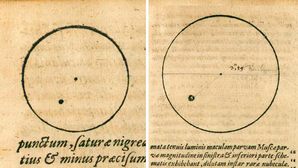Kepler’s 400 years-old sunspot drawings decoding solar mysteries
By IANS | Updated: July 26, 2024 18:45 IST2024-07-26T18:40:49+5:302024-07-26T18:45:13+5:30
New Delhi, July 26 Researchers have re-examined the legendary astronomer Johannes Kepler's sunspot drawings using modern techniques, revealing ...

Kepler’s 400 years-old sunspot drawings decoding solar mysteries
New Delhi, July 26 Researchers have re-examined the legendary astronomer Johannes Kepler's sunspot drawings using modern techniques, revealing previously hidden information about solar cycles before the grand solar minimum, showing he still has not lost any of his relevance.
Their findings, published in Astrophysical Journal Letters, offer key insights into the duration of solar cycles at the beginning of the 17th century, associated with the transition to the Maunder Minimum (1645-1715), a period of abnormally low sunspot activity.
Kepler's observations, made with a camera obscura, recorded a sunspot group in May 1607, initially mistaken for a transit of Mercury.
Nagoya University's Hisashi Hayakawa emphasised the significance of Kepler's sketch, noting it as the oldest sunspot record made with instrumental observation.
By analysing Kepler’s records and comparing them with contemporaneous data, the researchers identified the sunspot group as being at the end of solar cycle -13, contrasting with later observations showing sunspots at higher latitudes. This analysis supports the regular duration of solar cycle -13, challenging other reconstructions suggesting an extremely long cycle.
The study highlights Kepler’s legacy in astronomy, showing his sunspot records predate existing telescopic records by several years, providing valuable context for understanding changes in solar behaviour during a pivotal period.
Sabrina Bechet from the Royal Observatory of Belgium noted the continued relevance of historical figures' records in modern scientific research, underscoring Kepler's lasting impact on the field.
Disclaimer: This post has been auto-published from an agency feed without any modifications to the text and has not been reviewed by an editor
Open in app